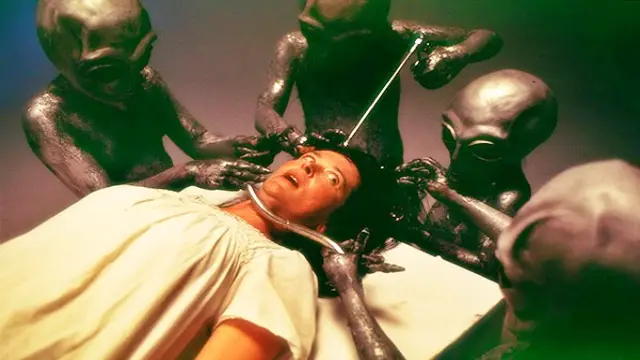nn
n
n Politeness is a qualification; it reassures othernmembers of a group that you are not a threat to the status quo. Bynperforming politely, you display to others that you can be trusted in theirncompany, that your behaviour will conform to the accepted mores, thatnyou are also a member of the group. Politeness is a badge that lets us knownthat you are one of us, that you belong here, that we all know our places.
n
n
n
 |
| Some of our Cousins |
n
n
n
nManynmillennia ago, our simian ancestors needed such assurances from other membersnof the clan, but also from strangers and outsiders, they needed to know thatneveryone was aware of their place in the pecking order and acknowledged thatnplace. We crave order, we look for patterns, we like the expected and thennormal; disorder, chaos and the abnormal starts our survival instinct bellsnringing, it puts us on edge, it raises our suspicions, it makes us uneasy. Wenlike things to be right. We don’t like it when things go wrong. We are at ournmost vulnerable when we sleep and when we eat – try this little experiment.
n
n
n
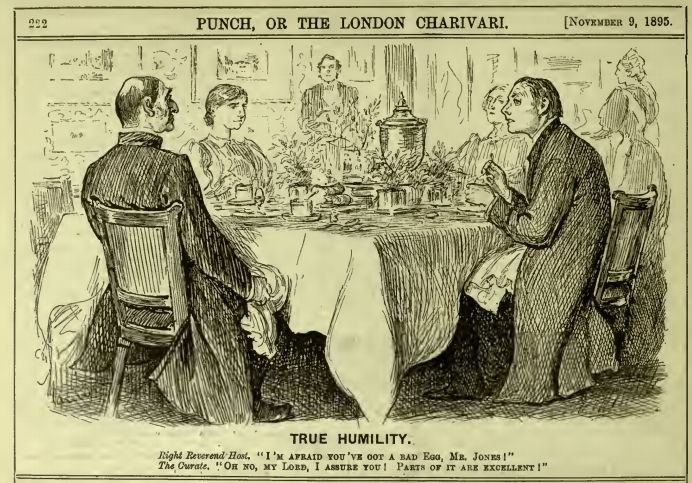 |
| True Humility – The Curate’s Egg – Punch – 1895 |
n
n
n
nWatch others when they are dining in public. Groups of people are usually atnease, they interact with each other; they talk and joke and frequently look atneach other, ignoring what is going on around their group. Now look at a lonendiner. Unless they are in a familiar place that they know to be safe, they willnconstantly look around; they may even not look at the food as they put it intontheir mouth, but will continue to scan the room, in order to identify anynpotential threat as they feed.
n
n
n
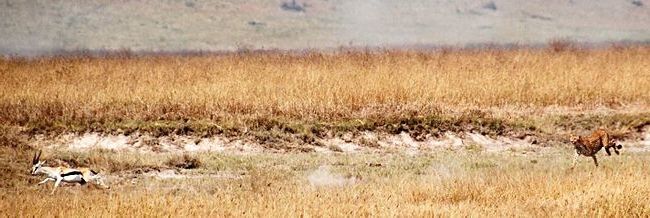 |
| Dinner is Scared |
n
n
n
nThink of animals out on the savannah – the herdsnhave plenty of eyes that will spot an approaching lion long before it gets toonnear; the individual creature is jumpy, ready to run for it, they snatch anmouthful of food and then raise their head and look around for the unexpected,nthe unusual or the threatening. We continue to respond to the same instinctnthat lies deep in our consciousness. So, when we stopped living on the plainsnof Africa and started living in houses and stopped expecting lions or leopardsnto interrupt our feeding patterns, we sublimated our instinctual urges andntable manners were born.
n
n
n
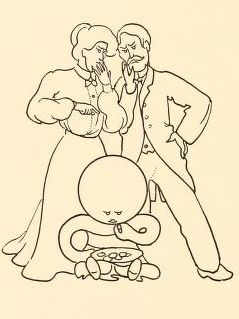 |
| Table Manners |
n
n
n
nThat’s why the early courtesy books were so big onntable manners – if you’re going to fit in, you need to know how to behave whennyou’re eating with the rest of us. Here’s some sound advice from Caxton’s ThenBoke of Curtesye (1477):
n
n
n
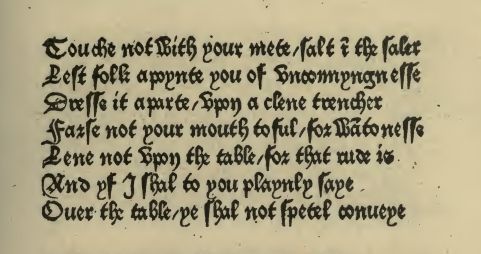 |
| William Caxton – The Boke of Curtesye – 1477 |
n
n
nnn
n
n
nTouche not with your mete salt in the salernnn
nLest folk apoynte you of vnconnyngnessennn
nDresse it aparte vpon a clene trenchernnn
nFarse not your mouth to ful for wantonessennn
nLene not vpon tbe table for that rude isnnn
nAnd yf I shal to you playnly sayennn
nOuer the table ye shal not spetel conueyennn
nnnn
nTouch not with meat salt in the cellar,nnn
nLest folk appoint you with uncunningness [ignorance]nnn
nDress it apart, upon a clean trencher [plate]nnn
nForce not your mouth too full for wantonness [greed]nnn
nLean not upon the table, for that is rudennn
nAnd if I shall to you plainly say,nnn
nOver the table you shall not spit convey.n
n
nnn
n
nnn
nContemporaneously with Caxton’s work is The Bokenof Nurture by John Russell, which is a guide for serving men although itncovers the manners expected by all in the dining room.
nnn
n
n
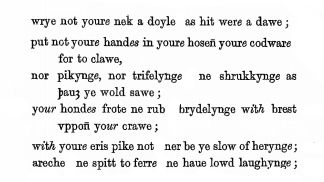 |
| John Russell – The Boke of Nature c.1470 |
n
n
nnn
n
n
nWrye not youre nek a doyle as hit were a dawe;nnn
nPut not youre handes in youre hosen youre codwarenfor to clawe,nnn
nNor pikynge, nor trifelynge ne shiukkynge as thau yenwold sawe;nnn
nYowr hondes frote ne rub brydelynge with brest vpponnyowr crawe;nnn
nWith youre eris pike not ner be ye slow of herynge;nnn
nAreche, ne spitt to ferre, ne haue lowd laughynge.nnn
nnnn
nDo not twist you neck awry like a jackdaw,nnn
nDo not put your hands in your hose, your codsn[testicles] to scratch,nnn
nDo not pick, trifle or shrug as if you are sawingn{wood},nnn
nDo not scratch or rub your hands, or puff out yournchest,nnn
nOr pick your ears nor be too slow of hearing,nnn
nOr retch, nor spit too far, nor laugh too loudly.n
n
nnn
n
n
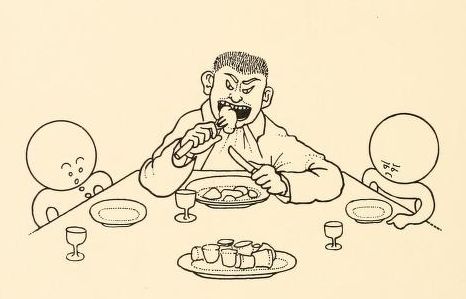 |
| Dear Oh Dear … |
n
n
nnn
nSo, now you know. And if you think this is allnfrightfully amusing and how terrible those mediaeval chappies were, here are anfew tips from Etiquette and Service of the Table from 1920;
nnn
n
n
nThe proper attitude at the table is an erect one.nOne should not slide down in the chair, rest one’s arm on the table, crowd, orndiscommode one’s neighbour. One should eat slowly and quietly, never talkingnwhile food is in the mouth.nnn
nSalt should never be put upon the table-cloth but onnthe side of a dish—preferably the bread-and-butter plate—unless individualnsalts are provided.nnn
nToothpicks, like toothbrushes, should be used onlyninside of one’s room.nnn
nSoiled hands, negligee dress, shirt-sleeves andndishevelled hair are inexcusable.nnn
nNo hot drink should be poured from the cup into thensaucer.n
n
nnn
n
n
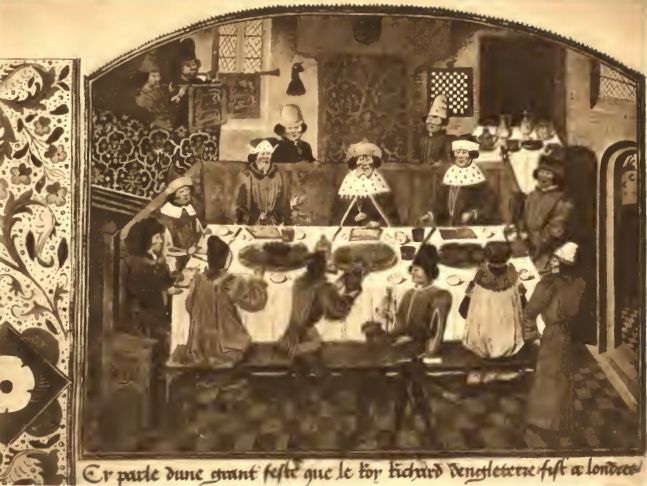 |
| Plus ca Change … |
n
n
nnn
nHardly all that different at all, really.
nnn
n
nnn
n
nnn
n
n
nn
n


















